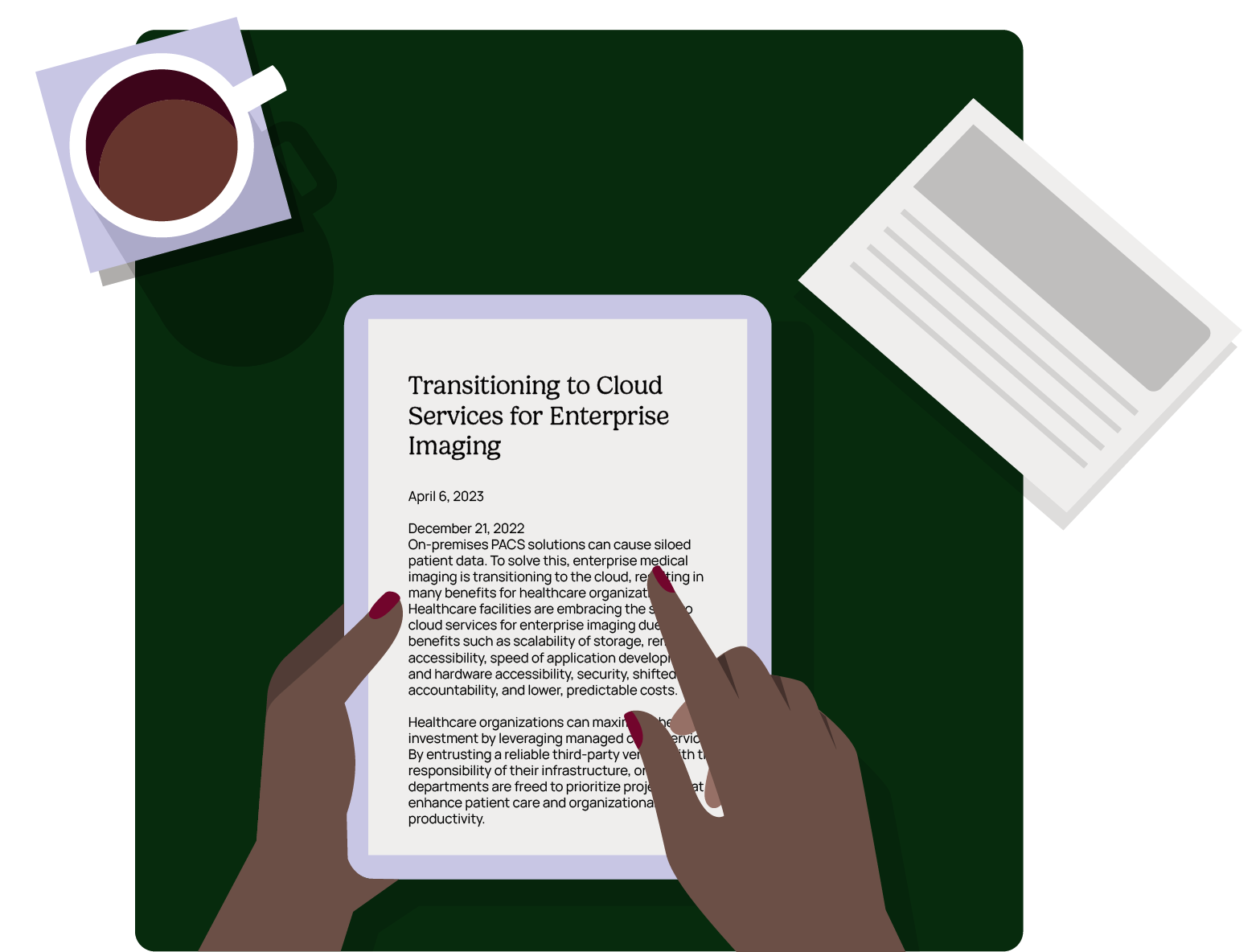December 21, 2022
On-premises PACS solutions can cause siloed patient data. To solve this, enterprise medical imaging is transitioning to the cloud, resulting in many benefits for healthcare organizations. Healthcare facilities are embracing the shift to cloud services for enterprise imaging due to benefits such as scalability of storage, remote accessibility, speed of application development and hardware accessibility, security, shifted accountability, and lower, predictable costs.
Healthcare organizations can maximize their IT investment by leveraging managed cloud services. By entrusting a reliable third-party vendor with the responsibility of their infrastructure, onsite departments are freed to prioritize projects that enhance patient care and organizational productivity.
Benefits of Cloud Services for Enterprise Imaging
Healthcare facilities can leverage the power of enterprise cloud services for medical imaging to unlock a range of benefits, including:
Scalability of Storage
The cloud provides a platform for medical facilities to seamlessly scale up storage as their practice expands, building the foundation for future growth. A consumption billing model provides the ideal solution for cost management, offering scalability and flexibility to accommodate any growth.
An effective strategy many healthcare facilities deploy is a hybrid cloud storage model, blending a mix of on-premises storage with cloud storage. This allows for a more seamless transition to a long-term, cloud-based archive solution when the time is right. Meanwhile, the existing PACS can remain on-premise- protecting the initial infrastructure investment.
Remote Accessibility
In the past, traditional PACS limited accessibility for caregivers while causing fragmentation of data, leading to suboptimal care decisions. Cloud-based PACS solutions are engineered to maximize convenience, giving medical professionals the ability to access critical data from any location.
For example, a radiologist no longer has to be physically present in the healthcare facility to access an X-ray to make a diagnostic decision. They can securely access enterprise-grade medical imaging from a workstation, tablet, or smartphone.
Speed of Application Development & Hardware Accessibility
Cloud-based native applications can be quickly developed and implemented so businesses can produce the right app for their needs in a fraction of the time.
With the availability of cloud-based applications and storage, organizations can grow their infrastructure quickly and affordably. For example, our client, Radiology Specialists of St. Joseph (RSSJ), could not expand servers due to supply chain issues. They complete more than 250,000 medical imaging studies per year, and storage is vital to their infrastructure. Our solution improved security and reduced redundancies, which was less costly than their prior storage system. We could execute faster with cloud-based storage than the older server-based storage while providing greater reliability for the client.
Security
Cloud-based PACS vendors are committed to keeping medical data secure with robust security protocols, ranging from password protection and encrypted sessions for connections to automatic logouts of viewers’ browsers. They also take extra precautions by providing network access controls, antivirus/malware scanning, cyber threat detection systems, and enforcing strong passwords- all focused on safeguarding sensitive patient information in the cloud environment.
To quantify the importance of security, in a survey of our prospects, 37% of respondents had been hit by a ransomware attack. The average bill for rectifying a ransomware attack was $1.85M USD. Larger organizations are more likely to be hit, and healthcare was the third highest attacked industry.
At Intelerad, we adhere to rules to mitigate a possible cyber attack, including the presumption of being attacked. Deploying routine backups, layered protection, combining human experts and anti-ransomware technology, and constructing a malware recovery plan are recommended principles of preparedness. Preparing in advance to be targeted or attacked, and implementing attack-defense plans yields better outcomes against cyber criminals.
Accountability
Hospitals transitioning to cloud-based enterprise imaging benefit from a shift in accountability, delegating 100% responsibility for the success of their technology platform to PACS vendors. Intelerad has decades of experience with enterprise cloud imaging solutions and has worked with thousands of facilities across the globe, from small to large, well-known radiology groups and health systems.
Lower Predictable Costs
The total cost of ownership (TCO) for on-premise PACS goes further than the IT staff, software, and equipment. Administrators must assess the entire picture, which can extend to:
IT labors Costs:
- 24×7 Support
- Regulatory Compliance
- Disaster Recovery
- Updates & Upgrades
- Technology Certifications
- Monitoring & Maintenance
- Continuing Education
- And more
Software Costs:
- Security Controls
- DR/Failover
- Updates and Upgrades
- Refresh Cycles
- License Compliance
- And more
Hardware Costs:
- Servers
- Storage
- Warranties
- Refresh Cycles
- And more
Datacenter Costs:
- Power
- Cooling
- Redundancy
- Security
- Industry Certifications
- And more
When shifting to cloud services for enterprise imaging, medical imaging becomes far more predictable as administrators can budget using a fee-per-study model.
Enterprise Cloud Imaging with Confidence
Intelerad Cloud is a suite of software and hardware solutions designed to meet any medical imaging facility need. Each use case is unique and requires a tailored approach for integration and for maximizing the investment. It includes solutions for on-premise, hybrid, and native cloud PACS setups, which include private cloud, long-term image storage, long-term archiving, disaster recovery, image exchange, plus enterprise software.
Intelerad has more than two decades of experience in radiology, cardiology, enterprise imaging, and workflow. Partnering with Intelerad for end-to-end enterprise imaging gives healthcare organizations the benefit of scalability to grow (or shrink) as needed. We manage hundreds of millions of studies and process petabytes of patient data annually for clients. Administrators can shift the accountability of the enterprise imaging infrastructure to our technology platform. Our highly-skilled experts and cutting-edge infrastructure ensure that each client project is completed with unparalleled success.
If your organization is seeking to move to the cloud for enterprise imaging solutions, contact our sales team today for a demo of Intelerad Cloud.





